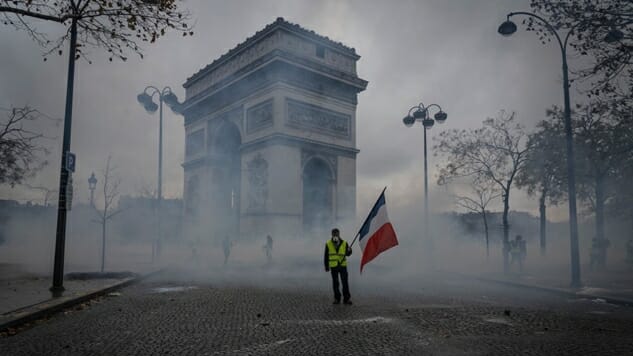Facebook is Helping to Fuel the Riots in France
Photo by Veronique de Viguerie/Getty
Today, BuzzFeed revealed how an intentional change to Facebook’s algorithm helped amplify the groups who are known for being massive outlets (and targets) of disinformation, and are also aiding the worst riots in France in decades:
In January this year, “Anger Groups” (Groupes Colère) started to appear across French Facebook. The first group was titled “Are you fed up? This is now! (anger + dept)” and it was started by a Portuguese bricklayer named Leandro Antonio Nogueira, who was living in the southwest département — or administrative territory — of Dordogne.
Nogueira’s group called for members to peacefully protest local authorities by blocking roads. Nogueira then quickly helped set up Anger Groups in other départements across France. These immediately gave lower-middle-class and working-class people in small towns a chance to complain about local issues. Nogueira’s first group, which is private, currently has around 90,000 members.
These pages weren’t exploding in popularity by coincidence. The same month that Nogueira set up his first group, Mark Zuckerberg announced an algorithm change to Facebook’s News Feed that would “prioritize news that is trustworthy, informative, and local.” The updates were meant to combat sensationalism, misinformation, and political polarization by emphasizing local networks over publisher pages.
This paragraph explains exactly how the sausage gets made inside the Facebook algorithm:
So, in less than two weeks, what you end up with is this: A Change.org petition with fewer than 1,500 subscribers gets talked about on a local radio station. The radio appearance is written up by a local news site. The article is shared to a local Facebook page. Thanks to an algorithm change that is now emphasizing local discussion, the article dominates the conversation in a small town. Two men from the same suburb then turn the petition into a Facebook event. A duplicate petition goes viral within the local Facebook groups. Then a daily newspaper writes up the original petition. This second article about the petition also goes viral. So does the original petition. And then the rest of French media follows.
This isn’t all Facebook’s fault. Quantifying credibility accurately may not even be mathematically possible, and I think it’s clear that we are all living in a highly-digitized world that we really do not understand. All that said, Facebook has a dangerous product and they know it. Facebook was the main tool used by the brutal regime in Myanmar to carry out a genocide of the Rohingya people. Sri Lanka also experienced an array of Facebook-fueled anti-Muslim violence, and the Facebook property WhatsApp helped spread misinformation that lead to lynchings in Brazil and India.
Not to mention, Facebook was the source of a powerful disinformation campaign here, as an immense amount of American dark money and Kremlin-fueled disinformation helped elect Donald Trump as president. When you compare the good that Facebook has done (provided people with digital communities) to the bad (was the preferred propaganda tool for a genocide), it’s pretty clear that the world would be better off if Facebook just disappeared. Their problem is and always has been a feckless leadership who apologizes for their unending array of screw-ups without actually fixing the underlying issues. Their PR goal forever and ever has been to run out the clock on today’s scandal so they can go back to selling everyone’s personal information to the highest bidder.
What’s happening in France is vastly complex and has to do with issues of class and national identity. What began as a protest against rising fuel taxes has morphed into a full-on rebuke of Emmanuel Macron and his agenda. Over 130,000 protestors showed up over the weekend, and polls show that 73% of the French support the yellow jackets.
There is a ton of natural anger that has nothing to do with Facebook and everything to do with Macron’s neoliberal policies, as the uproar over one member of Macron’s party not even knowing what the French minimum wage was symbolized. Macron’s fuel tax was instituted as a way to address climate change, but it was not accompanied with anything else to offset its short-term harmful impacts and address the massive unemployment and stagnant wages that make so many French lives unnecessarily desperate. French youth unemployment is 21%. For comparison’s sake, American youth unemployment is 8.3%.
One protestor framed the issue to Le Monde as “the elites are talking about the end of the world while we’re talking about the end of the month.”
The entire Western world pivoted hard to extreme capitalism over the last half-century, and we are all struggling with the same issues now: too few have too much and too many have too little. This is the natural anger underlying the activity on Facebook, and it is something the company must understand if they are to stop this cycle of violence that they continually find themselves a part of. Facebook isn’t the problem—our governments and economies are—but Facebook is sticking a megaphone in front of voices it doesn’t fully understand nor vet. That it consistently leads to violence is not what’s shocking—what’s shocking is that Facebook seems to be surprised by this same scenario playing out again and again and again.
Any social network incentivized towards hyperbole and sensationalism is going to have these problems, and in many ways, Facebook is just going down a similar path as cable news, as this is the economic model that’s been established for all of news. The difference is that Facebook can reach more corners of the globe than CNN can, and it has a harder time tamping down on misinformation. Facebook wants to effectively be the internet in some areas of the world, but they don’t want the responsibility that comes with that kind of power, and this is why so many people think so little of the social media titan.
Jacob Weindling is a staff writer for Paste politics. Follow him on Twitter at @Jakeweindling.







































